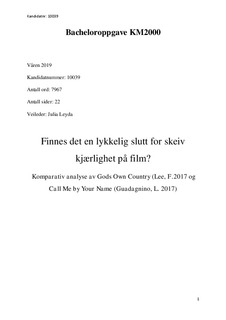| dc.contributor.advisor | Leyda, Julia | |
| dc.contributor.author | Lundby, Elin Maria | |
| dc.date.accessioned | 2019-08-24T14:00:48Z | |
| dc.date.available | 2019-08-24T14:00:48Z | |
| dc.date.issued | 2019 | |
| dc.identifier.uri | http://hdl.handle.net/11250/2610524 | |
| dc.description.abstract | Denne bacheloren er en tematisk og ideologisk komparativ analyse av "Gods Own Country"(Guadagnino, L. 2017) og "Call Me by Your Name" (Lee, F. 2017). Her ser jeg på hvordan homoseksualitet fremstilles på film i dag, og har blitt fremstil gjennom filmhistorien. Her kommer jeg til å fokusere på hvordan homoseksualitet i coming of age- filmer fremstilles Jeg vil spørre om det er noen forskjeller i fremstilling i forhold til tid, maskulinitet og lykkelig slutt. Har Call Me by Your Name fått mer annerkjennelse enn Gods Own Country fordi den er mer «heterovennlig»? Og finnes det mer håp i skeiv romanse på film i dagens filmindustri? | |
| dc.description.abstract | This Bachelor is a thematic and ideological comparative analysis of "Gods Own Country" (Guadagnino, L. 2017) and "Call Me by Your Name" (Lee, F.2017). I look at how homosexuality is portrayed on film today and has been portrayed through our film history. Here I will focus on how homosexuality in coming of age films is portrayed. Has Call Me by Your Name received more recognition than Gods Own Country because it is more "heterosexual friendly"? And is there more hope for queer romance on film in today's film industry? | |
| dc.language | nob | |
| dc.publisher | NTNU | |
| dc.title | Finnes det en lykkelig slutt for skeiv kjærlighet på film? | |
| dc.type | Bachelor thesis | |
